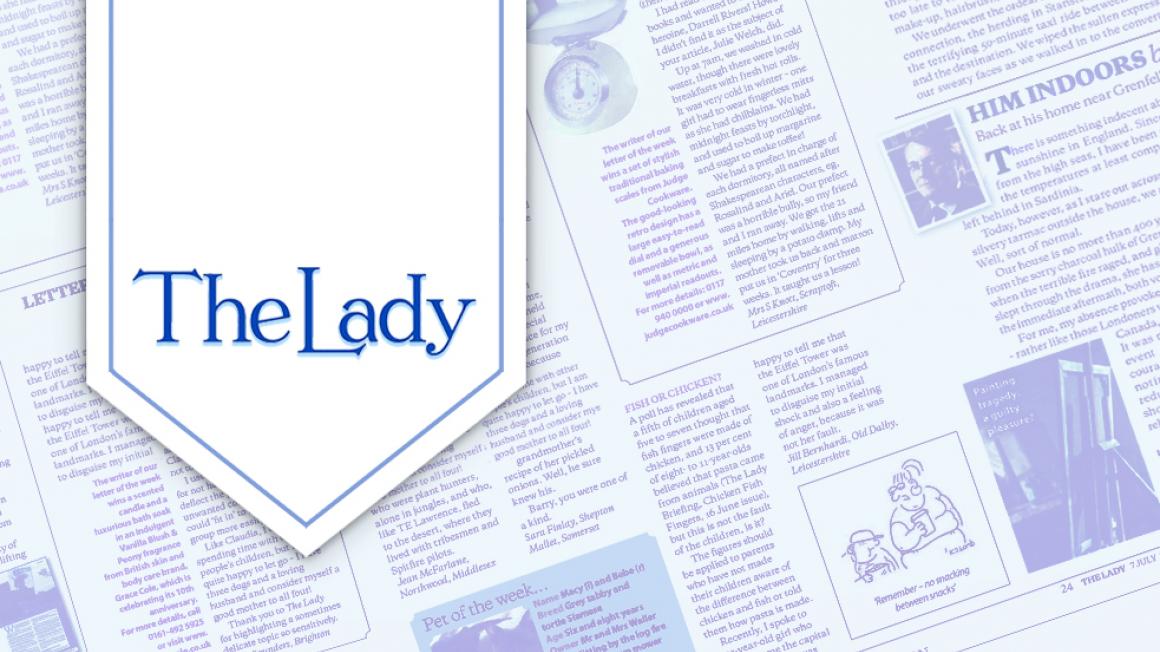Book Reviews: 16 June
OUT NOW
OUT NOW SYMPATHY by Olivia Sudjic (Pushkin One, £14.99)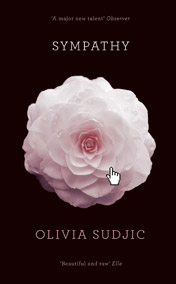
Lives ruled by electronic devices; natural disasters; disappearing aeroplanes: Sudjic’s absorbing debut novel reads like a fictional dystopia. But chillingly, the world she describes is contemporary reality – a first-person narrative of identity and obsession shaped by online experiences.
For a novel about a quest for origins, you couldn’t pick a better protagonist than a mixed-race, adopted girl with a missing father. Twenty-three-year-old Alice travels to New York to meet Silvia, her unknown adoptive father’s mother. As her relationship with her grandmother develops, Alice sets out to explore Manhattan on foot in a series of meditative outings that make for some of the book’s most evocative passages.
Then, Alice discovers Mizuko – a beautiful thirty-something Japanese writer whose life has striking parallels with her own (she too has an unknown, absent father). Interest turns to obsession as Alice follows Mizuko’s social media feeds compulsively, and engineers a meeting ‘in real life’. What follows is an unflinching dissection of an infatuation that sets off a dangerous chain of events.
Alice’s warts-and-all characterisation remains compelling despite her foibles and sinister aspects – or, in fact, perhaps because of them.
Examining the psychological fallout of the digital age, this is a searing, well-crafted story – although it suffers from the common first-timer’s flaw of trying to pack too much in. If you have millennial daughters or grand-daughters, it’s a timely eye-opener – but it will have you reaching for the gin.
Juanita Coulson
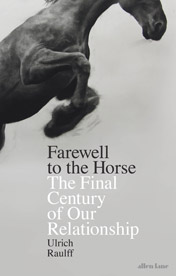 FAREWELL TO THE HORSE: The Final Century of Our Relationship by Ulrich Raulff, translated by Ruth Ahmedzai Kemp (Allen Lane, £25)
FAREWELL TO THE HORSE: The Final Century of Our Relationship by Ulrich Raulff, translated by Ruth Ahmedzai Kemp (Allen Lane, £25)Man’s relationship with the horse has endured for millennia and has now come to an abrupt end, claims this intelligently written and provocative book, explaining how humans and horses have gone their separate ways. Drawing on childhood memories of farm horses, Raulff argues that the bond between man and horse, based on the horse’s utility as a beast of burden and a weapon of war, is over.
To Raulff, the horse is the abstract creatureof the sculptor’s pedestal or the ideal of a poem. To him it is never quite a living creature of sweat and dung, capable of being loved and giving love in return. This lack of empathy for either of his two subjects, man and beast, coupled with overblown prose (describing the horse as a vector will annoy equestrians and mathematicians in equal measure), detracts from what is an otherwise entertaining read.
There are many interesting vignettes and diversions, but often only hinted at: the great New York horse stampede of 1823 being but one example. And, as anyone who lives or works with horses will attest, reports of the death of the relationship have been greatly exaggerated. Stephen Coulson
BOOK OF THE WEEK
A writer’s retreat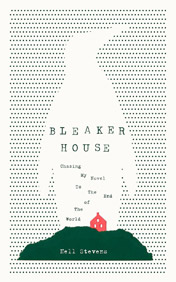
BLEAKER HOUSE By Nell Stevens (Picador, £12.99)
Nell Stevens’ opening description of the grey and featureless Bleaker island may not amuse the Falklands Tourist Board: ‘This is a landscape an art-therapy patient might paint to represent depression,’ she dryly observes. But for stevens the desolation of this remote British outpost is the draw: determined to write the first draft of a novel, she has sought out a place free from distractions where, she imagines, she will effortlessly turn out her daily target of words.
Needless to say, things don’t go to plan. As soon as she arrives Stevens realises she has woefully underestimated her calorific requirements (there are no shops on Bleaker Island, the official population of which is two) and instead of being honed by her spartan existence, she finds her sanity threatening to fray. Transformed into memoir, Stevens plays her gruelling, six-week experiment for (often painful) laughs. Yet Bleaker House also confronts enduring questions about the writer’s craft: is it better to wait for inspiration, or simply to force the words out? Is hermit-like isolation the secret to success, or can interesting prose only be borne out of an interesting life?
Wince-inducingly honest, this cautionary tale is clever and funny – even for those who have never thought of putting pen to paper.
Stephanie Cross
COFFEE TABLE BOOK
SEA MUSIC: Anthony Caro by Alastair Sooke, Stephen Feeke and Jim Aitchison, photographs by David Ward (Ridinghouse, £15.99)Located on Poole quayside, Sir Anthony Caro’s blue-painted installation sea music was designed to evoke the sound and appearance of the cascading sea through interlocking rings and curves recalling the masts and sails of ships. In 1991, Caro (1924-2013) gifted it to the town, having spent many enjoyable holidays in Dorset. ‘Even if you don’t like it, the installation’s three platforms provide great views over the harbour and a place to eat fish and chips,’ comments artist Paul Caro (Anthony’s son).

This beautifully illustrated book has been published to mark the conservation of sea music, badly rusted after 25 years battered by the elements on the seafront. A must for modern art lovers. RW
PAPERBACKS
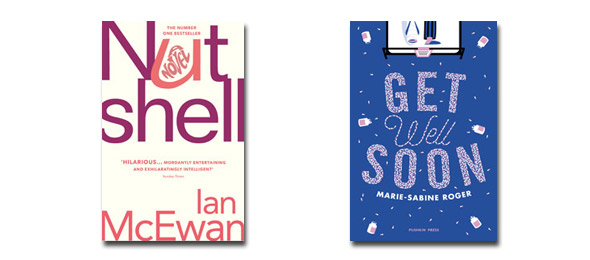
NUTSHELL by Ian McEwan (Vintage, £8.99)McEwan turns his pen again to wry humour and satire with this tale of adultery, deceit and murder that nods wittily to Shakespeare’s Hamlet in its plot and title (a reference to a line in the play). It has a most unusual narrator: an unborn baby boy. Social critique meets thriller as said foetus listens to his decadent mother Trudy and greedy paternal uncle Claude, who are having a sordid affair and planning to kill his father and seize the family home. The narrator’s voice has a refined sensibility and world-weariness – to great comic effect, especially in his commentary on everything from immigration to fine wines. The ‘rotten state’ here is the sexual voracity and moral bankruptcy of the characters. An intelligent and hugely entertaining read. JC
GEt WELL SOON by Marie-Sabine Roger, translated by Frank Wynne (Pushkin Press, £8.99)
Rescued from drowning in Paris’s River Seine, and stuck in hospital for six weeks after, sixty- something misanthropic widower Jeanne-Pierre looks back on his life, while cheered by a stream of quirky visitors, including some unexpected new acquaintances. There’s the rent-boy who saved him, a ‘concerned cop with huge, sad antelope eyes’, and a surly teenage girl. The hospital patient’s experience is brilliantly described: ‘the days start early, 6am’, which ‘leaves lots of time to feel depressed later’. Although short, and definitely not for the squeamish, this is a magical, tender and darkly humorous novel. Its pocket size makes it an ideal, heart- warming holiday read. Rebecca Wallersteiner
THE LADY’S RECIPE READS
With summer holidays on the horizon, our thoughts turn to lighter, healthier cooking. By Juanita Coulson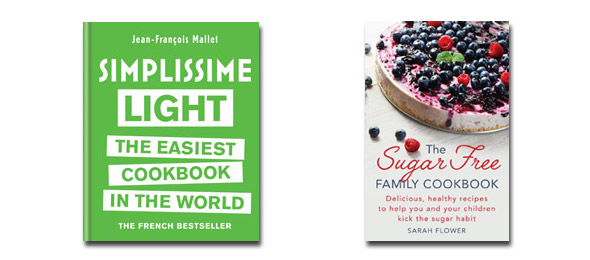
THE SUGAR-FREE FAMILY COOKBOOK: Delicious, Healthy Recipes to Help You and Your Children Kick the Sugar Habit by Sarah Flower (Robinson, £12.99))
Sugar is the new fat, the ultimate food fiend, responsible for everything from obesity to Type 2 diabetes, and nhs guidelines say we should dramatically reduce our intake. Described in the foreword as a ‘bright-smiling dietary soldier’, nutritionist Sarah Flower wages war on sugar for the sake of our health, alerting us to hidden sugars in processed foods, but also the dangers of fructose (fruit sugars) and refined carbs. Her low-carb, low-fructose and sugar-free recipes are surprisingly appealing. Yes, there is a certain amount of scaremongering, but we could all do with eating less of the stuff: here’s an enjoyable way to do it.
SIMPLISSIME LIGHT: The Easiest Cookbook in the World by Jean- François Mallet (Hamlyn, £20)
Here’s a winning premise for a cookbook: recipes with no more than five ingredients, written by a French chef and food photographer. As we all know, French women don’t get fat, and there is something very chic about making a delicious dish with just a few ingredients – the culinary equivalent of taking off one accessory before leaving the house. There are light lunches like chicken and pumpkin brochettes, classics like salmon parcels with vegetables, and treats like a gratin of nectarines with pine nuts. Unconventionally for a French chef, he caters for every dietary need: gluten-free, dairy-free, low-cal, even – whisper it – the odd vegetarian dish. A go-to book for healthy summer meals – much more fun than going on a diet.
Tweet us your recipe reads @TheLadyMagazine using #ladyrecipereads


